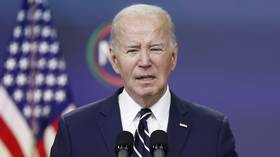‘Second strike’ option for Moscow: Criticism of Russian reporting goes nuclear in the WSJ
When an opinion piece in the Wall Street Journal conjures the language of nuclear war and calls for a “second strike” option against alleged Russian disinformation, at least you know where you stand.
Analysis of Russia comes as standard with a sprinkle of Cold War vernacular and an aversion to seeing an issue from both sides. It sells papers and gets grants, but who is it helping?
Simply debunking disinformation won't keep the attackers away. To deter disinformation campaigns, we need a second-strike capability. (After #Salisbury, the Brits provided a good though not perfect example of how to it can be done.) My op-ed in @WSJ: https://t.co/VyaJjnwS62. pic.twitter.com/nVwU36dbM9
— Elisabeth Braw (@elisabethbraw) March 12, 2019
The Wall Street Journal piece in question carries the headline ‘The Kremlin loves using disinformation to sow chaos. Deterrence requires a plan for a second strike’. It’s written by Elisabeth Braw, an analyst at think-tank, the Royal United Services Institute (RUSI). Braw runs its ‘Deterrence’ project, a role which has shaped her analysis surrounding the poisoning of former spy Sergei Skripal and his daughter.
Braw’s idea of deterrence is based around hitting back at alleged disinformation with disinformation. For example she says: “Britain’s response to the attacks on the Skripals wasn’t perfect. In an April 2018 interview, the director of the UK’s military laboratory seemed to suggest that the poison’s origin hadn’t been established. The central communications team set up to brief the public occasionally misjudged the news cycle and the information it released received little attention.”
Also on rt.com ‘Anonymous intelligence sources’ thrive in post-Skripal limelightEssentially Braw is criticising the government for allowing senior figures to say what they believe to be true even if it goes against the agreed narrative. Essentially, accusing Russia of trying to shape a message, and then criticising Britain for not doing the same.
Also, in something as serious as the Skripal incident should the release of information from official sources be based on whether it is interesting or whether it is relevant? Braw wants clickbait for the news cycle.
She does later praise the response from London saying: “The Brits did, however, demonstrate second-strike intent and capability by not just debunking Russian disinformation but by hitting back.” Does she mean hitting back with its own disinformation? That’s for the reader to decide.
“The Kremlin-backed media outlets RT and Sputnik both presented a stream of other explanations” to events in Salisbury according to Braw. This is a common thread in recent Russia analysis that actually shines a light on the accuser. RT does tend to report on statements from Russia, that is the bread and butter of journalism. It also does look for other explanations to events. The bigger question is why is this regarded as such a threat?
By Simon Rite












